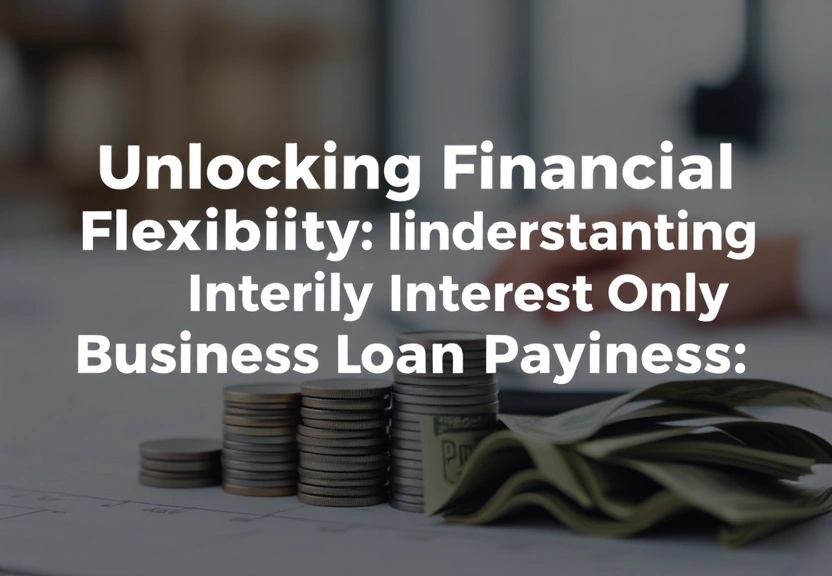Unlocking Financial Flexibility: Understanding Interest-Only Business Loan Payments
In the ever-evolving landscape of business financing, understanding the various loan structures available is crucial for entrepreneurs aiming to optimize their financial strategies. One such structure that has gained traction in recent years is the interest-only business loan payment. This option allows business owners to focus on stabilizing their operations without the immediate pressure of full principal repayment, thereby enhancing financial flexibility.

In this article, we will delve into the concept of interest-only loans, the benefits they offer, and how they can be strategically leveraged to improve cash flow management. Additionally, we will explore lender options and provide insights into critical considerations for businesses contemplating this payment approach.
What Are Interest-Only Business Loans?
Interest-only business loans are a type of financing arrangement where borrowers are required to pay only the interest on the principal balance for a specified period. This structure contrasts with traditional loans, where both interest and principal are paid simultaneously from the outset. Typically, interest-only payment periods range from 6 months to several years, depending on the lender and the terms of the loan.
How Interest-Only Payments Work
When a business opts for an interest-only loan, they pay a lower monthly amount during the interest-only period. This can be particularly advantageous for startups or businesses experiencing temporary cash flow challenges. For instance, if a business takes out a $100,000 loan with an interest rate of 5%, the monthly interest payment during the interest-only period would be approximately $416.67. Once the interest-only period ends, the borrower would then transition to paying both principal and interest, which would significantly increase monthly payments.
The Benefits of Interest-Only Business Loans
Interest-only loans can provide several advantages for business owners, especially during periods of financial uncertainty. Here are some key benefits:
- Improved Cash Flow: By reducing monthly payments during the interest-only period, businesses can retain more cash for operational expenses, investments, or unexpected costs.
- Financial Flexibility: This repayment structure allows businesses to stabilize their operations without the burden of high monthly payments, thus providing breathing room for growth.
- Short-Term Relief: Businesses facing temporary downturns or unexpected expenses can utilize interest-only payments to navigate challenging periods without incurring additional debt.
- Potential for Increased Profitability: With more cash on hand, businesses can invest in marketing, technology, or other growth initiatives that could enhance profitability.
Cash Flow Management with Interest-Only Payments
Effective cash flow management is a cornerstone of a successful business strategy. Interest-only loans can play a critical role in managing cash flow, particularly during challenging times. Here’s how:
Strategic Allocation of Resources
With reduced monthly loan obligations, businesses can allocate funds more strategically. For instance, instead of channeling a significant portion of revenue towards loan repayments, they can invest in inventory, staff training, or marketing campaigns that drive revenue generation.
Maintaining Operational Stability
During times of economic uncertainty, maintaining operational stability is paramount. Interest-only payments provide businesses the necessary liquidity to cover essential expenses such as payroll, rent, and utilities. This can be particularly important for seasonal businesses or those experiencing fluctuations in demand.
Planning for Future Growth
By freeing up cash flow, business owners can plan for future growth opportunities. Whether it’s expanding into new markets or launching new products, having the financial flexibility to act can be a game changer. Interest-only payments help ensure that businesses are not stifled by immediate repayment obligations.
Understanding Lender Options for Interest-Only Loans
While interest-only loans offer substantial benefits, not all lenders provide this option. Understanding your lender options is crucial in finding the right loan structure for your business needs.
Types of Lenders
Interest-only loans can be obtained from various types of lenders, including:
- Traditional Banks: Some banks offer interest-only loans, particularly for commercial real estate. However, they may have stricter qualification criteria.
- Online Lenders: Many online lenders provide a range of flexible financing options, including interest-only loans with faster approval times and less stringent requirements.
- Credit Unions: Often more community-focused, credit unions may offer competitive rates and terms for interest-only loans.
- Alternative Financing Options: This includes peer-to-peer lending platforms and private investors who may be open to negotiating interest-only payment structures.
Evaluating Loan Terms
When considering an interest-only loan, it’s essential to evaluate the terms carefully. Key factors to assess include:
- Interest Rate: Ensure that the interest rate is competitive compared to other financing options.
- Duration of Interest-Only Period: Understand how long you can make interest-only payments before transitioning to full repayment.
- Fees and Penalties: Be aware of any fees associated with the loan and potential penalties for early repayment.
- Repayment Structure: Clarify how repayment will work once the interest-only period concludes.
Critical Considerations Before Choosing Interest-Only Payments
While interest-only loans offer significant benefits, they also come with inherent risks. Here are some critical considerations to keep in mind:
Potential for Higher Long-Term Costs
While monthly payments are lower during the interest-only period, borrowers need to be aware that they will pay more in interest over the life of the loan. This is particularly true if they do not pay down the principal during the interest-only phase.
Risk of Payment Shock
Once the interest-only period ends, borrowers may experience a significant increase in monthly payments, commonly referred to as “payment shock.” It’s essential to plan for this transition to avoid potential cash flow issues.
Impact on Credit Score
How a business manages its loan payments can impact its credit score. Consistent, timely payments are crucial, but if a business struggles to transition to full payments, this could lead to credit rating issues.
Frequently Asked Questions (FAQ)
1. What is an interest-only business loan?
An interest-only business loan is a financing option where borrowers pay only the interest on the loan for a specified period, delaying principal repayment.
2. Who should consider an interest-only payment structure?
Businesses facing short-term cash flow challenges, startups, or those experiencing seasonal fluctuations may benefit from interest-only payments.
3. How long can I make interest-only payments?
The duration of interest-only payments varies by lender and can range from a few months to several years.
4. Are there risks associated with interest-only loans?
Yes, potential risks include higher long-term costs, payment shock when transitioning to full payments, and possible impacts on credit scores if payments are not managed responsibly.
5. How do I find lenders that offer interest-only loans?
Research various types of lenders, including traditional banks, online lenders, and credit unions, to find options that fit your needs. Compare terms, rates, and eligibility requirements to make an informed decision.
Conclusion
Unlocking financial flexibility through interest-only business loan payments can be a strategic move for many entrepreneurs. By understanding how this payment structure works and weighing its benefits against potential risks, business owners can make informed decisions that align with their financial goals. Whether you’re looking to navigate temporary cash flow challenges or strategically invest in growth opportunities, interest-only loans may provide the relief and flexibility needed to thrive in a competitive landscape. Always consult with financial advisors or industry experts to ensure that this option aligns with your long-term business strategy.
📰 Original Source
Este artigo foi baseado em informações de: https://www.nerdwallet.com/article/small-business/interest-only-business-loan


